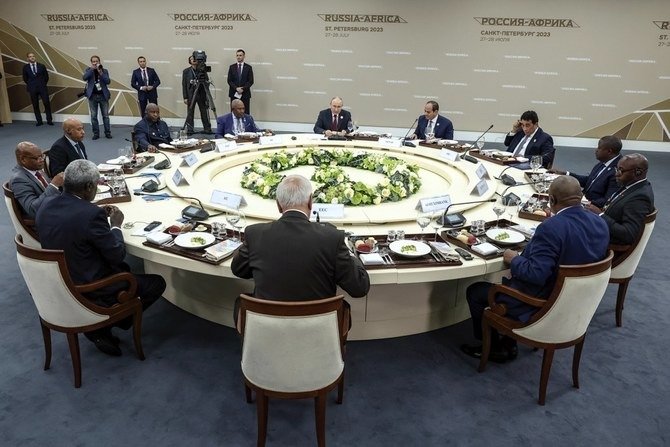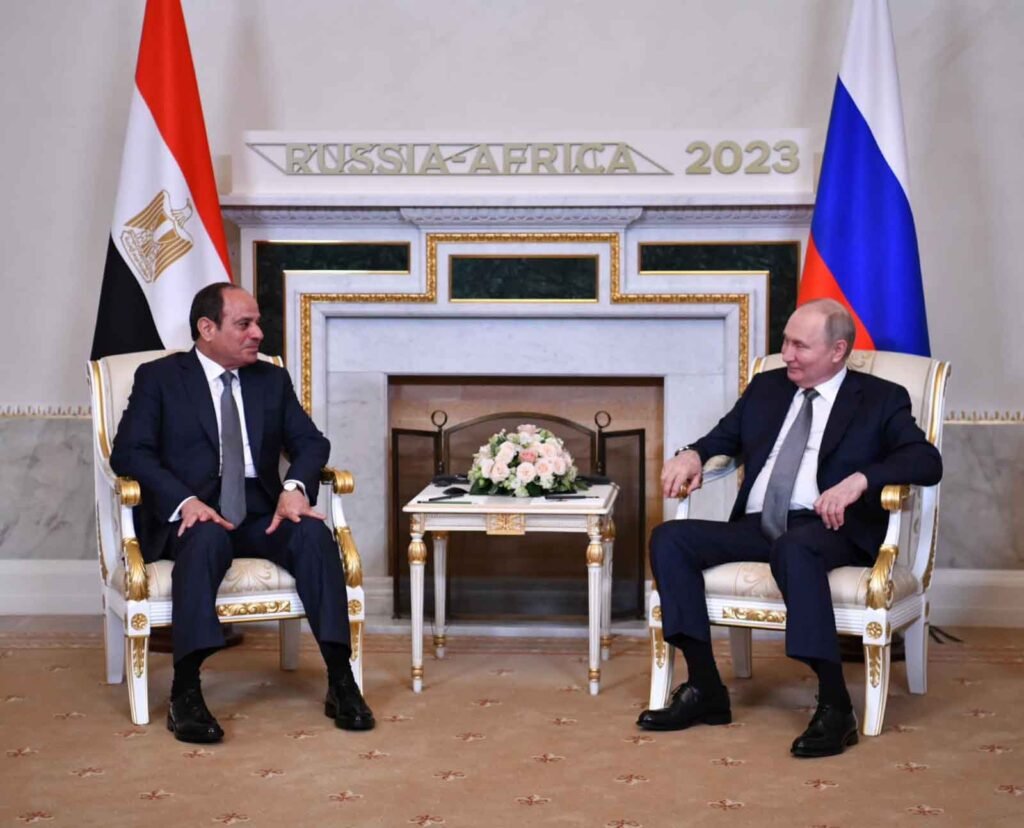Observers see the summit as a chance for Putin to propose a direct grain supply plan to Africa, possibly excluding Ukraine from the global market
During the Russia-Africa summit held in St. Petersburg, Russian President Vladimir Putin made significant promises to six African nations, seeking to take advantage of the collapse of the Black Sea grain deal. This deal was a UN-brokered arrangement that facilitated the export of grain and other products from Ukraine through the Black Sea to various markets, including those in Africa. As a result of Moscow’s decision to abandon the deal, Ukrainian grain exports were blocked, leading to concerns about food security in affected regions.
You can also read: Niger Soldiers Proclaim Coup on National TV: What went wrong?
President Putin addressed attending African leaders and assured them that Russia would step in to provide free grain supplies to mitigate the impact of the discontinued grain deal. Burkina Faso, Zimbabwe, Mali, Somalia, the Central African Republic, and Eritrea are the nations that will benefit from this humanitarian gesture. Putin stated that Russia would be prepared to provide these countries with 25,000-50,000 tonnes of grain in the coming months.
The decision to withdraw from the grain deal was influenced in part by western sanctions that restricted the sale of Russian agricultural products abroad. Although the deal, facilitated by Turkey, had been in place for about a year and had facilitated the safe transit of billions of dollars’ worth of grain from Ukraine via the Black Sea, Russia cited various reasons for its withdrawal.
From grain crisis to African Helicopter diplomacy
Despite President Putin’s offer of free grain supplies, UN Secretary-General AntónioGuterres expressed concerns that these donations alone would not be sufficient to address the significant impact of the deal’s termination. The end of the deal has raised worries about food prices and food security in various regions.
Observers believe that this summit provides President Putin with an opportunity to propose a direct grain supply plan to Africa, potentially cutting Ukraine out of the global market. Moscow has previously utilized the grain issue to garner support from countries in the global south for its actions in Ukraine and to rally against western sanctions. Additionally, Russia has argued that the grain deal prioritized “well-fed European markets” over African nations. While there have been acknowledgments that the desired rate of grain exports to the poorest developing countries has not been achieved, the deal has played a role in reducing global food prices by over 23%. However, wheat prices have been increasing in global markets since Russia’s withdrawal from the agreement.
As the Russia-Africa summit commenced, it was revealed that Russian President Vladimir Putin had gifted a helicopter to Zimbabwe’s President EmmersonMnangagwa. The Zimbabwean government spokesman expressed excitement about the helicopter, stating that it would soon be gracing their skies.
Despite Russia’s diplomatic efforts in Africa, there are evident signs of growing frustration on the continent over Russia’s decision to withdraw from the grain deal, raising concerns about a potential food supply crisis. Only 17 African heads of state attended the summit, less than half of the 43 who participated in the first Russia-Africa summit in 2019 held in Sochi. When questioned about the low attendance, Putin’s press secretary, Dmitry Peskov, attributed it to western pressure on African countries to prevent their active participation in the forum.
The Wagner Group’s influence in Central Africa and beyond
Another topic less likely to be openly discussed is the role of the Wagner mercenary group, which is most active in Central African Republic (CAR), Libya, Mali, and Sudan. The Kremlin has repeatedly assured that it will not reduce Wagner’s activities in Africa following YevgenyPrigozhin’s aborted rebellion. Prigozhin, who is associated with the Wagner group, unexpectedly appeared at the summit despite an agreement with the Kremlin for him to be in exile in Belarus.
This meeting was said to have taken place at the Trezzini Palace hotel in St Petersburg, reportedly owned by Prigozhin. Additionally, Prigozhin was seen shaking hands with the head of the Cameroonian edition of AfriqueMédia, a pro-Russia television outlet targeting French-speaking African countries, which has also been linked to the Wagner group.

His continued presence in the country suggests that the Kremlin has been either unwilling or unable to remove him as the head of the Wagner group. Although the Kremlin previously stated that Prigozhin met with Putin to discuss Wagner’s future after his march on Moscow, he has since been photographed in Belarus.
The complex interactions between Russia, African nations, and the Wagner group raise significant questions about regional stability, food security, and diplomatic relations in Africa. As the summit progresses, the international community will closely monitor how these issues are addressed and what implications they may have for the continent’s future.
A deal was reached to end the rebellion involving the Wagner mercenary group, which had resulted in the seizure of a major southern city and a march towards the capital. As part of the agreement, charges against YevgenyPrigozhin, the leader of the Wagner group, were dropped, and he was ordered to move into exile in Belarus. However, a video circulating on social media depicted Prigozhin allegedly addressing his fighters in Belarus, criticizing Russia’s war effort in Ukraine as a “disgrace.”
Prior to the Russia-Africa summit, Prigozhin conducted a unique interview with the pro-Kremlin television channel AfriqueMédia, which specifically targets French-speaking African nations. During the interview, Prigozhin asserted that there would be no reduction in the Wagner group’s programs in Africa.
Meanwhile, Russia’s military continued to target grain infrastructure in Ukrainian port cities, with an attack on port facilities in Odesa’s Black Sea region resulting in the death of one person and significant damage. Over the course of nine days, Russia reportedly damaged 26 port infrastructure facilities and five civilian vessels in an attempt to disrupt Kyiv’s globally significant agricultural exports following its exit from the grain deal.
According to OleksandrKubrakov, the deputy prime minister for the restoration of Ukraine and infrastructure minister, Russia has also been restricting shipping in the area of temporarily occupied Crimea and near the territorial waters of Bulgaria.
These events indicate escalating tensions in the region, with the Wagner group’s activities and Prigozhin’s exiled status raising concerns about the stability of African nations. Moreover, Russia’s aggressive actions targeting Ukrainian grain infrastructure have further complicated the situation, with potential implications for food security and regional trade. As the situation unfolds, international attention remains focused on the developments and their potential impact on the broader geopolitical landscape.
Key issues in focus
Russian President Vladimir Putin is set to address the situation in Ukraine during a working lunch with a gathering of African heads of state at the Russia-Africa summit. The Kremlin spokesman also mentioned that the ongoing coup attempt and detainment of Niger’s President Mohamed Bazoum are being actively discussed on the sidelines of the summit.
The summit provides an opportunity for African and Russian leaders to exchange views on key issues, including the grain deal, against the backdrop of changing dynamics due to the coronavirus pandemic and the military offensive in Ukraine. VsevolodSviridov of the Center for African Studies at HSE University highlighted the importance of finding common ground and explaining respective positions on topical matters.

During the summit, President Putin has already held talks with Ethiopian Prime Minister Abiy Ahmed and Egyptian President Abdel Fattah al-Sisi, where they discussed joint energy projects. Delegations from other African states, including Mozambique and Libya, have also arrived in St. Petersburg for the summit.
In recent times, Russia has been seeking to strengthen diplomatic and security ties with Africa, with Foreign Minister Sergei Lavrov making two tours of the continent this year. Russia’s Wagner mercenary group has been actively involved in the security sphere in Africa, although its failed mutiny against Russia’s military leadership has raised questions about the group’s future operations on the continent.
The Russia-Africa summit precedes a summit of leaders from BRICS countries (Brazil, Russia, India, China, and South Africa) to be held in Johannesburg. South Africa has stated that President Putin will not attend the BRICS summit in person due to an international arrest warrant related to his actions in Ukraine.


